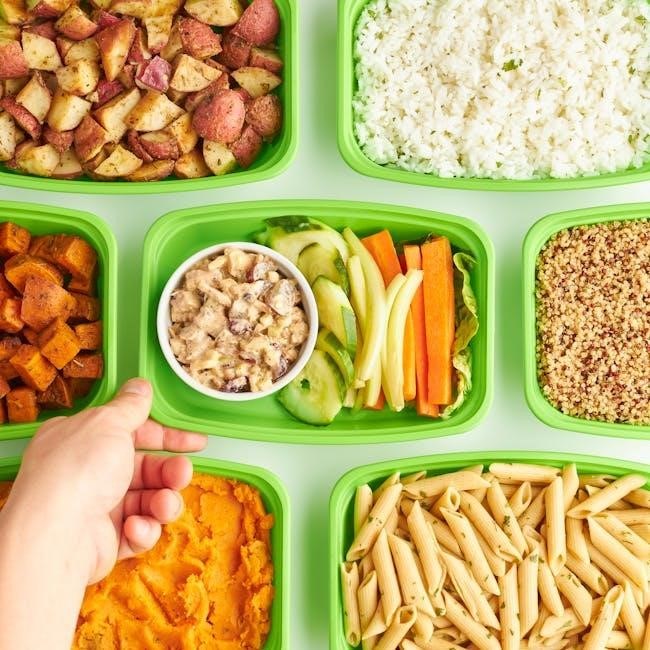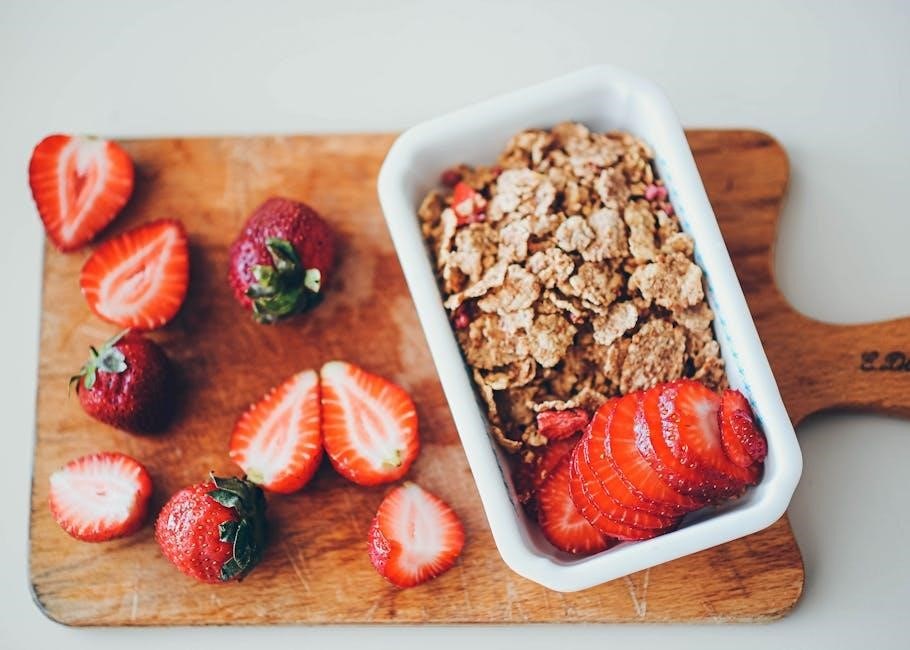Embark on a transformative journey with a 30-day plant-based diet plan, designed to promote health, sustainability, and delicious eating. This structured program guides you through adopting a vegetarian lifestyle, focusing on whole, unprocessed foods like fruits, vegetables, legumes, and grains. Perfect for beginners, it offers a gradual transition to a plant-based diet, ensuring nourishment and satisfaction. Discover how this plan can help you improve your health, reduce environmental impact, and explore flavorful, creative meals.
What is a Plant-Based Diet?
A plant-based diet emphasizes whole, unprocessed foods derived from plants, such as fruits, vegetables, legumes, whole grains, nuts, and seeds. It minimizes or excludes animal products, though some versions may include small amounts of dairy or eggs. This dietary approach focuses on natural, nutrient-dense foods to promote health and sustainability. Unlike vegan diets, plant-based plans can vary in flexibility, allowing occasional inclusion of animal-derived foods; The core principle is to prioritize plant-centric meals while reducing reliance on meat and processed items. This lifestyle choice appeals to those seeking improved health, environmental benefits, and a more ethical way of eating.
Benefits of a 30-Day Plant-Based Diet
Adopting a 30-day plant-based diet offers numerous health benefits, including weight loss, improved blood flow, and enhanced overall well-being. This eating plan helps lower cholesterol and blood pressure, reducing the risk of heart disease. It also supports better digestion due to high fiber intake from fruits, vegetables, and whole grains. Many participants report increased energy levels and improved mental clarity. Additionally, a plant-based diet promotes environmental sustainability by reducing greenhouse gas emissions associated with animal agriculture. This short-term commitment can lead to long-term lifestyle changes, fostering healthier habits and a more balanced relationship with food.

Understanding the Basics of a Plant-Based Diet

A plant-based diet focuses on whole, minimally processed foods like vegetables, fruits, whole grains, and legumes. It emphasizes natural ingredients, reducing reliance on animal products for nutrition.
Key Foods to Include
A well-rounded plant-based diet emphasizes whole, nutrient-dense foods. Focus on including a variety of colorful vegetables, fresh fruits, and fiber-rich whole grains. Legumes, such as lentils, beans, and chickpeas, are excellent sources of protein and essential nutrients. Nuts and seeds provide healthy fats and vitamins, while plant-based proteins like tofu and tempeh are great alternatives to meat. Incorporate herbs, spices, and fermented foods like kimchi and sauerkraut for added flavor and gut health benefits. Healthy fats, including avocados and olive oil, should also be part of your daily meals for sustained energy and satisfaction.
- Fruits: Apples, berries, bananas, and citrus fruits
- Vegetables: Leafy greens, broccoli, carrots, and sweet potatoes
- Whole Grains: Quinoa, brown rice, oats, and whole-grain bread
- Legumes: Lentils, chickpeas, black beans, and peas
- Nuts and Seeds: Almonds, chia seeds, flaxseeds, and walnuts
- Plant-Based Proteins: Tofu, tempeh, edamame, and seitan
- Healthy Fats: Avocados, olive oil, and coconut oil
Foods to Avoid
Adopting a plant-based diet requires eliminating certain foods to maximize health benefits. Avoid all animal products, including meat, dairy, eggs, and honey, as they are not aligned with a plant-based lifestyle. Refrain from consuming processed and packaged foods, which are often high in unhealthy fats, sugars, and sodium. Limit sugary snacks, refined carbohydrates, and foods with artificial additives, as they can hinder weight management and overall well-being. Also, avoid high-sodium foods and those with excessive oil, which can negatively impact heart health. By focusing on whole, unprocessed foods, you’ll create a balanced and nutritious plant-based diet.
- Animal Products: Meat, poultry, fish, dairy, eggs, and honey
- Processed Foods: Packaged snacks, frozen meals, and sugary drinks
- Refined Carbohydrates: White bread, pasta, and sugary baked goods
- High-Sodium Foods: Canned goods and processed soups
- Unhealthy Fats: Fried foods and foods with excessive oil
Creating a 30-Day Meal Plan
Design a structured 30-day plant-based meal plan with weekly breakdowns, ensuring variety and nutrition. Focus on seasonal ingredients and balanced meals to ease the transition.
Structure of the 30-Day Plan
The 30-day plant-based plan is divided into five phases, each focusing on specific nutritional and lifestyle changes. Weeks 1-2 introduce foundational plant-based meals, emphasizing whole grains, vegetables, and legumes. Weeks 3-4 explore diverse flavors and recipes, incorporating new ingredients like tofu and quinoa. The final week concentrates on meal prep and sustainability, ensuring long-term success. Each phase includes daily meal ideas, shopping lists, and tips to maintain motivation and track progress. This gradual approach helps participants adapt seamlessly to a plant-based lifestyle, making it easier to stick with the program beyond the initial 30 days.
Sample 7-Day Meal Plan
A sample 7-day meal plan provides a clear roadmap for adopting a plant-based diet. Day 1: Oatmeal with fruits for breakfast, lentil soup for lunch, and veggie stir-fry for dinner. Day 2: Smoothie bowl, quinoa salad, and stuffed bell peppers. Day 3: Whole-grain toast with avocado, minestrone soup, and roasted vegetables. Day 4: Chia pudding, chickpea curry, and avocado salad. Day 5: Veggie omelet, brown rice bowl, and zucchini noodles. Day 6: Yogurt parfait, black bean tacos, and steamed broccoli. Day 7: Pancakes, grilled vegetable wrap, and baked sweet potato. This plan ensures variety and balance, making it easy to follow and enjoy.
Grocery Shopping for a Plant-Based Diet
Stock your pantry with whole grains, legumes, fruits, and vegetables. Incorporate nuts, seeds, and plant-based milk for variety. Plan meals and read labels to avoid hidden animal products.
Essential Grocery Items

Stock your kitchen with whole, unprocessed foods like fresh fruits, vegetables, and leafy greens. Include whole grains such as brown rice, quinoa, and oats. Legumes like lentils, chickpeas, and black beans are versatile and protein-rich. Nuts and seeds provide healthy fats and snacks. Plant-based milks, tofu, and tempeh are great alternatives to dairy. Herbs, spices, and nutritional yeast add flavor to dishes. Don’t forget healthy fats like avocados, olive oil, and coconut oil. For convenience, keep canned beans, tomatoes, and plant-based soups on hand. A well-stocked pantry ensures you’re prepared for delicious, nutritious meals throughout your 30-day journey.
Tips for Shopping on a Budget
A plant-based diet doesn’t have to be expensive. Start by buying grains, beans, and legumes in bulk, as they are cost-effective and versatile. Plan your meals for the week and make a grocery list to avoid impulse purchases. Look for coupons, sales, and loyalty programs at your local stores. Opt for seasonal produce, which is often cheaper and fresher. Consider store-brand or generic options for pantry staples, as they are typically priced lower than name-brand products. These strategies will help you maintain a healthy, budget-friendly plant-based diet throughout your 30-day journey.

Common Challenges and Solutions
Adapting to a plant-based diet can present challenges like cravings and protein concerns. Plan meals, stock plant-based staples, and seek support to stay on track successfully.
Overcoming Protein Deficiency Concerns
A common concern when adopting a plant-based diet is ensuring adequate protein intake. However, plant-based diets can easily meet protein needs with the right choices. Legumes, beans, lentils, tofu, tempeh, nuts, seeds, and whole grains are excellent protein sources. Incorporate a variety of these foods daily to maintain protein balance. For example, lentils and chickpeas are high in protein, while quinoa and amaranth are complete proteins. Pairing whole grains with nuts or seeds can also enhance protein content. Meal planning and consulting a nutritionist can help address specific concerns and ensure a well-rounded diet. With proper preparation, protein deficiency is easily avoidable on a plant-based diet.
Dealing with Cravings
Cravings can be a significant challenge when transitioning to a plant-based diet. To manage them effectively, identify triggers and plan ahead. Stock healthy snacks like nuts, fruits, and roasted chickpeas to satisfy sudden urges. Incorporate flavorful and satisfying plant-based alternatives, such as vegan chocolate or nut-based cheeses, to curb cravings for non-plant-based foods. Staying hydrated and ensuring adequate nutrition can also reduce cravings. Meal prepping and maintaining a balanced diet with whole foods helps minimize the desire for unhealthy options. Over time, your taste preferences will adapt, making it easier to stick to your plant-based lifestyle and enjoy the benefits of a healthier diet.

Health Benefits of a Plant-Based Diet
A 30-day plant-based diet promotes significant health improvements, including weight loss, improved blood pressure, and better cholesterol levels. It reduces the risk of chronic diseases like heart disease and diabetes, supporting overall well-being and longevity.
Weight Loss and Improved Health Markers
A 30-day plant-based diet often leads to noticeable weight loss and improved health markers. By focusing on whole, unprocessed foods like fruits, vegetables, and legumes, individuals typically experience a reduction in body fat and improved blood pressure. Cholesterol levels tend to decrease, lowering the risk of heart disease. Many people also report better blood sugar control, which can reduce the risk of developing type 2 diabetes. The high fiber content in plant-based meals promotes satiety and supports healthy digestion. Over time, these changes contribute to a significant improvement in overall health and well-being, making a plant-based diet a sustainable choice for long-term health benefits.
Environmental Impact

Adopting a plant-based diet significantly reduces your environmental footprint. Animal agriculture is a major contributor to greenhouse gas emissions, deforestation, and water pollution. By choosing plant-based options, you lower your carbon footprint and help conserve water and land. Plant-based diets require fewer resources to produce, making them more sustainable. Additionally, reducing meat consumption decreases the demand for industrial farming practices that harm ecosystems. Opting for organic, seasonal, and locally sourced foods can further minimize your environmental impact. This shift not only benefits your health but also contributes to a healthier planet, making it a win-win choice for sustainability and personal well-being.
Monitoring Progress and Staying Motivated
Track your journey with a diet journal or mobile app to monitor progress. Celebrate milestones, share experiences, and stay motivated by setting realistic goals and rewarding achievements.
Tracking Your Diet Journey
Monitoring your progress is key to staying motivated. Use a diet journal or mobile app to log meals, track calories, and note how you feel. Take progress photos and weekly measurements to visualize changes. Celebrate small milestones, like completing a week without cravings or noticing improved energy levels. Reflect on challenges and adjust your plan as needed. Sharing your journey with a friend or online community can also boost accountability and morale. Remember, consistency is more important than perfection—every step forward is a victory on your path to a healthier, plant-based lifestyle.
Maintaining Long-Term Success
To sustain a plant-based lifestyle beyond 30 days, focus on building lasting habits. Meal prep and experimenting with new recipes can keep your diet exciting. Surround yourself with like-minded individuals or join online communities for support. Set realistic goals and celebrate milestones, no matter how small. Continuously educate yourself on plant-based nutrition to make informed choices. Remember, it’s a lifestyle, not a temporary fix. Stay committed by reminding yourself of the benefits, such as improved health and environmental impact. Regularly assess your progress and adjust as needed. With dedication and the right mindset, long-term success on a plant-based diet is achievable and rewarding.

